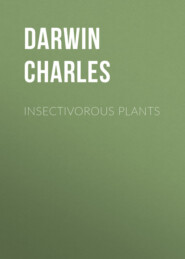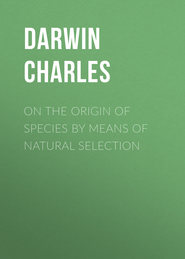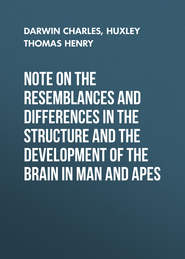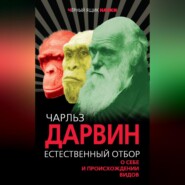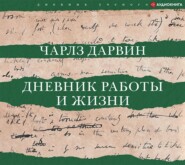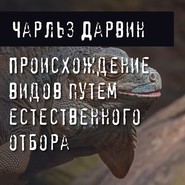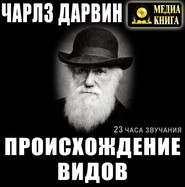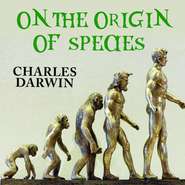По всем вопросам обращайтесь на: info@litportal.ru
(©) 2003-2024.
✖
Charles Darwin: His Life Told in an Autobiographical Chapter, and in a Selected Series of His Published Letters
Настройки чтения
Размер шрифта
Высота строк
Поля
"I am working very steadily at my big book; I have found it quite impossible to publish any preliminary essay or sketch; but am doing my work as completely as my present materials allow without waiting to perfect them. And this much acceleration I owe to you."
Again to Mr. Fox, in February, 1857: —
"I am got most deeply interested in my subject; though I wish I could set less value on the bauble fame, either present or posthumous, than I do, but not I think, to any extreme degree: yet, if I know myself, I would work just as hard, though with less gusto, if I knew that my book would be published for ever anonymously."
C. D. to A. R. Wallace. Moor Park, May 1st, 1857
My dear Sir – I am much obliged for your letter of October 10th, from Celebes, received a few days ago; in a laborious undertaking, sympathy is a valuable and real encouragement. By your letter and even still more by your paper[144 - "On the Law that has regulated the Introduction of New Species." —Ann. Nat. Hist., 1855.] in the Annals, a year or more ago, I can plainly see that we have thought much alike and to a certain extent have come to similar conclusions. In regard to the Paper in the Annals, I agree to the truth of almost every word of your paper; and I dare say that you will agree with me that it is very rare to find oneself agreeing pretty closely with any theoretical paper; for it is lamentable how each man draws his own different conclusions from the very same facts. This summer will make the 20th year (!) since I opened my first note-book, on the question how and in what way do species and varieties differ from each other. I am now preparing my work for publication, but I find the subject so very large, that though I have written many chapters, I do not suppose I shall go to press for two years. I have never heard how long you intend staying in the Malay Archipelago; I wish I might profit by the publication of your Travels there before my work appears, for no doubt you will reap a large harvest of facts. I have acted already in accordance with your advice of keeping domestic varieties, and those appearing in a state of nature, distinct; but I have sometimes doubted of the wisdom of this, and therefore I am glad to be backed by your opinion. I must confess, however, I rather doubt the truth of the now very prevalent doctrine of all our domestic animals having descended from several wild stocks; though I do not doubt that it is so in some cases. I think there is rather better evidence on the sterility of hybrid animals than you seem to admit: and in regard to plants the collection of carefully recorded facts by Kölreuter and Gaertner (and Herbert) is enormous. I most entirely agree with you on the little effects of "climatal conditions," which one sees referred to ad nauseam in all books: I suppose some very little effect must be attributed to such influences, but I fully believe that they are very slight. It is really impossible to explain my views (in the compass of a letter), on the causes and means of variation in a state of nature; but I have slowly adopted a distinct and tangible idea, – whether true or false others must judge; for the firmest conviction of the truth of a doctrine by its author, seems, alas, not to be the slightest guarantee of truth!..
In December 1857 he wrote to the same correspondent: —
"You ask whether I shall discuss 'man.' I think I shall avoid the whole subject, as so surrounded with prejudices; though I fully admit that it is the highest and most interesting problem for the naturalist. My work, on which I have now been at work more or less for twenty years, will not fix or settle anything; but I hope it will aid by giving a large collection of facts, with one definite end. I get on very slowly, partly from ill-health, partly from being a very slow worker. I have got about half written; but I do not suppose I shall publish under a couple of years. I have now been three whole months on one chapter on Hybridism!
"I am astonished to see that you expect to remain out three or four years more. What a wonderful deal you will have seen, and what interesting areas – the grand Malay Archipelago and the richest parts of South America! I infinitely admire and honour your zeal and courage in the good cause of Natural Science; and you have my very sincere and cordial good wishes for success of all kinds, and may all your theories succeed, except that on Oceanic Islands, on which subject I will do battle to the death."
And to Fox in February 1858: —
"I am working very hard at my book, perhaps too hard. It will be very big, and I am become most deeply interested in the way facts fall into groups. I am like Crœsus overwhelmed with my riches in facts, and I mean to make my book as perfect as ever I can. I shall not go to press at soonest for a couple of years."
The letter which follows, written from his favourite resting place, the Water-Cure Establishment at Moor Park, comes in like a lull before the storm, – the upset of all his plans by the arrival of Mr. Wallace's manuscript, a phase in the history of his life to which the next chapter is devoted.
C. D. to Mrs. Darwin. Moor Park, April [1858]
The weather is quite delicious. Yesterday, after writing to you, I strolled a little beyond the glade for an hour and a half, and enjoyed myself – the fresh yet dark green of the grand Scotch firs, the brown of the catkins of the old birches, with their white stems, and a fringe of distant green from the larches, made an excessively pretty view. At last I fell fast asleep on the grass, and awoke with a chorus of birds singing around me, and squirrels running up the trees, and some woodpeckers laughing, and it was as pleasant and rural a scene as ever I saw, and I did not care one penny how any of the beasts or birds had been formed. I sat in the drawing-room till after eight, and then went and read the Chief Justice's summing up, and thought Bernard[145 - Simon Bernard was tried in April 1858 as an accessory to Orsini's attempt on the life of the Emperor of the French. The verdict was "not guilty."] guilty, and then read a bit of my novel, which is feminine, virtuous, clerical, philanthropical, and all that sort of thing, but very decidedly flat. I say feminine, for the author is ignorant about money matters, and not much of a lady – for she makes her men say, "My Lady." I like Miss Craik very much, though we have some battles, and differ on every subject. I like also the Hungarian; a thorough gentleman, formerly attaché at Paris, and then in the Austrian cavalry, and now a pardoned exile, with broken health. He does not seem to like Kossuth, but says, he is certain [he is] a sincere patriot, most clever and eloquent, but weak, with no determination of character…
CHAPTER XI.
THE WRITING OF THE 'ORIGIN OF SPECIES.'
"I have done my best. If you had all my material I am sure you would have made a splendid book." – From a letter to Lyell, June 21, 1859.
JUNE 18, 1858, TO NOVEMBER 1859
C. D. to C. Lyell. Down, 18th [June 1858]
My dear Lyell – Some year or so ago you recommended me to read a paper by Wallace in the Annals,[146 - Annals and Mag. of Nat. Hist., 1855.] which had interested you, and as I was writing to him, I knew this would please him much, so I told him. He has to-day sent me the enclosed, and asked me to forward it to you. It seems to me well worth reading. Your words have come true with a vengeance – that I should be forestalled. You said this, when I explained to you here very briefly my views of 'Natural Selection' depending on the struggle for existence. I never saw a more striking coincidence; if Wallace had my MS. sketch written out in 1842, he could not have made a better short abstract! Even his terms now stand as heads of my chapters. Please return me the MS., which he does not say he wishes me to publish, but I shall, of course, at once write and offer to send to any journal. So all my originality, whatever it may amount to, will be smashed, though my book, if it will ever have any value, will not be deteriorated; as all the labour consists in the application of the theory.
I hope you will approve of Wallace's sketch, that I may tell him what you say.
My dear Lyell, yours most truly
C. D. to C. Lyell. Down, [June 25, 1858]
My dear Lyell – I am very sorry to trouble you, busy as you are, in so merely personal an affair; but if you will give me your deliberate opinion, you will do me as great a service as ever man did, for I have entire confidence in your judgment and honour…
There is nothing in Wallace's sketch which is not written out much fuller in my sketch, copied out in 1844, and read by Hooker some dozen years ago. About a year ago I sent a short sketch, of which I have a copy, of my views (owing to correspondence on several points) to Asa Gray, so that I could most truly say and prove that I take nothing from Wallace. I should be extremely glad now to publish a sketch of my general views in about a dozen pages or so; but I cannot persuade myself that I can do so honourably. Wallace says nothing about publication, and I enclose his letter. But as I had not intended to publish any sketch, can I do so honourably, because Wallace has sent me an outline of his doctrine? I would far rather burn my whole book, than that he or any other man should think that I had behaved in a paltry spirit. Do you not think his having sent me this sketch ties my hands?.. If I could honourably publish, I would state that I was induced now to publish a sketch (and I should be very glad to be permitted to say, to follow your advice long ago given) from Wallace having sent me an outline of my general conclusions. We differ only, [in] that I was led to my views from what artificial selection has done for domestic animals. I would send Wallace a copy of my letter to Asa Gray, to show him that I had not stolen his doctrine. But I cannot tell whether to publish now would not be base and paltry. This was my first impression, and I should have certainly acted on it had it not been for your letter.
This is a trumpery affair to trouble you with, but you cannot tell how much obliged I should be for your advice.
By the way, would you object to send this and your answer to Hooker to be forwarded to me? for then I shall have the opinion of my two best and kindest friends. This letter is miserably written, and I write it now, that I may for a time banish the whole subject; and I am worn out with musing…
My good dear friend, forgive me. This is a trumpery letter, influenced by trumpery feelings.
Yours most truly.
I will never trouble you or Hooker on the subject again.
C. D. to C. Lyell. Down, 26th [June 1858]
My dear Lyell – Forgive me for adding a P.S. to make the case as strong as possible against myself.
Wallace might say, "You did not intend publishing an abstract of your views till you received my communication. Is it fair to take advantage of my having freely, though unasked, communicated to you my ideas, and thus prevent me forestalling you?" The advantage which I should take being that I am induced to publish from privately knowing that Wallace is in the field. It seems hard on me that I should be thus compelled to lose my priority of many years' standing, but I cannot feel at all sure that this alters the justice of the case. First impressions are generally right, and I at first thought it would be dishonourable in me now to publish.
Yours most truly.
P.S. – I have always thought you would make a first-rate Lord Chancellor; and I now appeal to you as a Lord Chancellor.
C. D. to J. D. Hooker. Tuesday night [June 29, 1858]
My dear Hooker – I have just read your letter, and see you want the papers at once. I am quite prostrated,[147 - After the death, from scarlet fever, of his infant child.] and can do nothing, but I send Wallace, and the abstract[148 - "Abstract" is here used in the sense of "extract;" in this sense also it occurs in the Linnean Journal, where the sources of my father's paper are described.] of my letter to Asa Gray, which gives most imperfectly only the means of change, and does not touch on reasons for believing that species do change. I dare say all is too late. I hardly care about it. But you are too generous to sacrifice so much time and kindness. It is most generous, most kind. I send my sketch of 1844 solely that you may see by your own handwriting that you did read it. I really cannot bear to look at it. Do not waste much time. It is miserable in me to care at all about priority.
The table of contents will show what it is.
I would make a similar, but shorter and more accurate sketch for the Linnean Journal.
I will do anything. God bless you, my dear kind friend.
I can write no more. I send this by my servant to Kew.
The joint paper[149 - "On the tendency of Species to form Varieties and on the Perpetuation of Varieties and Species by Natural Means of Selection." —Linnean Society's Journal, iii. p. 53.] of Mr. Wallace and my father was read at the Linnean Society on the evening of July 1st. Mr. Wallace's Essay bore the title, "On the Tendency of Varieties to depart indefinitely from the Original Type."
My father's contribution to the paper consisted of (1) Extracts from the sketch of 1844; (2) part of a letter, addressed to Dr. Asa Gray, dated September 5, 1857. The paper was "communicated" to the Society by Sir Charles Lyell and Sir Joseph Hooker, in whose prefatory letter a clear account of the circumstances of the case is given.
Referring to Mr. Wallace's Essay, they wrote: —
"So highly did Mr. Darwin appreciate the value of the views therein set forth, that he proposed, in a letter to Sir Charles Lyell, to obtain Mr. Wallace's consent to allow the Essay to be published as soon as possible. Of this step we highly approved, provided Mr. Darwin did not withhold from the public, as he was strongly inclined to do (in favour of Mr. Wallace), the memoir which he had himself written on the same subject, and which, as before stated, one of us had perused in 1844, and the contents of which we had both of us been privy to for many years. On representing this to Mr. Darwin, he gave us permission to make what use we thought proper of his memoir, &c.; and in adopting our present course, of presenting it to the Linnean Society, we have explained to him that we are not solely considering the relative claims to priority of himself and his friend, but the interests of science generally."
Sir Charles Lyell and Sir J. D. Hooker were present at the reading of the paper, and both, I believe, made a few remarks, chiefly with a view of impressing on those present the necessity of giving the most careful consideration to what they had heard. There was, however, no semblance of a discussion. Sir Joseph Hooker writes to me: "The interest excited was intense, but the subject was too novel and too ominous for the old school to enter the lists, before armouring. After the meeting it was talked over with bated breath: Lyell's approval and perhaps in a small way mine, as his lieutenant in the affair, rather overawed the Fellows, who would otherwise have flown out against the doctrine. We had, too, the vantage ground of being familiar with the authors and their theme."
Mr. Wallace has, at my request, been so good as to allow me to publish the following letter. Professor Newton, to whom the letter is addressed, had submitted to Mr. Wallace his recollections of what the latter had related to him many years before, and had asked Mr. Wallace for a fuller version of the story. Hence the few corrections in Mr. Wallace's letter, for instance bed for hammock.
A. R. Wallace to A. Newton. Frith Hill, Godalming, Dec. 3rd, 1887
My dear Newton – I had hardly heard of Darwin before going to the East, except as connected with the voyage of the Beagle, which I think I had read. I saw him once for a few minutes in the British Museum before I sailed. Through Stevens, my agent, I heard that he wanted curious varieties which he was studying. I think I wrote to him about some varieties of ducks I had sent, and he must have written once to me. I find on looking at his "Life" that his first letter to me is given in vol. ii. p. 95, and another at p. 109, both after the publication of my first paper. I must have heard from some notices in the Athenæum, I think (which I had sent me), that he was studying varieties and species, and as I was continually thinking of the subject, I wrote to him giving some of my notions, and making some suggestions. But at that time I had not the remotest notion that he had already arrived at a definite theory – still less that it was the same as occurred to me, suddenly, in Ternate in 1858. The most interesting coincidence in the matter, I think, is, that I, as well as Darwin, was led to the theory itself through Malthus – in my case it was his elaborate account of the action of "preventive checks" in keeping down the population of savage races to a tolerably fixed, but scanty number. This had strongly impressed me, and it suddenly flashed upon me that all animals are necessarily thus kept down – "the struggle for existence" – while variations, on which I was always thinking, must necessarily often be beneficial, and would then cause those varieties to increase while the injurious variations diminished.[150 - This passage was published as a footnote in a review of the Life and Letters of Charles Darwin which appeared in the Quarterly Review, Jan. 1888. In the new edition (1891) of Natural Selection and Tropical Nature (p. 20), Mr. Wallace has given the facts above narrated. There is a slight and quite unimportant discrepancy between the two accounts, viz. that in the narrative of 1891 Mr. Wallace speaks of the "cold fit" instead of the "hot fit" of his ague attack.] You are quite at liberty to mention the circumstances, but I think you have coloured them a little highly, and introduced some slight errors. I was lying on my bed (no hammocks in the East) in the hot fit of intermittent fever, when the idea suddenly came to me. I thought it almost all out before the fit was over, and the moment I got up began to write it down, and I believe finished the first draft the next day.
I had no idea whatever of "dying," – as it was not a serious illness, – but I had the idea of working it out, so far as I was able, when I returned home, not at all expecting that Darwin had so long anticipated me. I can truly say now, as I said many years ago, that I am glad it was so; for I have not the love of work, experiment and detail that was so pre-eminent in Darwin, and without which anything I could have written would never have convinced the world. If you do refer to me at any length, can you send me a proof and I will return it to you at once?
Yours faithfully







